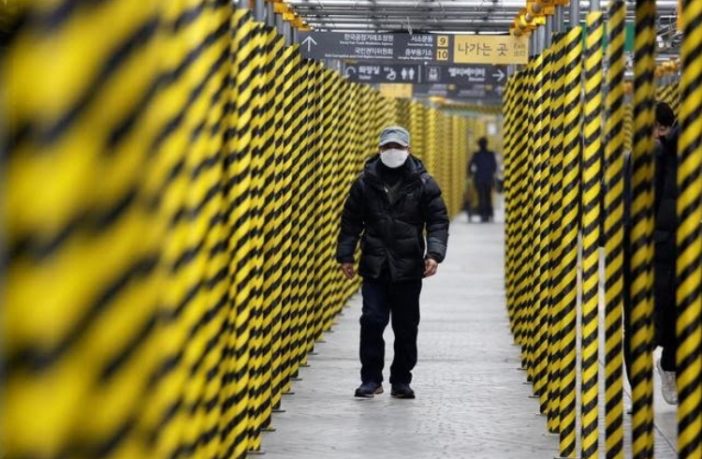Scores of new coronavirus cases and a first death in South Korea fanned fears on Thursday of the global spread of the pathogen as research suggested it was more contagious than thought and China appealed to its Southeast Asian neighbours for solidarity.
China, where the virus emerged in December, reported a sharp drop in new cases but the data was partly attributable to a change in how it diagnoses the virus and the figures could not quell growing alarm about its spread.
As China cut interest rates to ease the pain for struggling businesses, concern about the impact of the coronavirus on the world’s second largest economy led to investors ditching everything from the Australian dollar to the Indian rupee to find safety in U.S. dollar assets.
“People are trying to get far away from the economic fallout that we might see from the coronavirus. You want your capital as far away from China as possible,” said Chris Weston, Melbourne-based head of research at broker Pepperstone.
The coronavirus emerged in the central Chinese city of Wuhan late last year, apparently in a wildlife market, and has now infected some 75,000 people and killed about 2,100.
The vast majority of cases and deaths have been in China, and more specifically Hubei province, of which Wuhan is capital, but the global spread appears inexorable.
South Korea confirmed its first death from the virus hours after the mayor of its fourth-largest city urged residents to stay indoors after a spike of 53 new infections, most traced to a church attended by a 61-year-old woman, known as “Patient 31”, who tested positive.
Malls and cinemas in Daegu, a city of 2.5 million people, were empty and its usually bustling downtown streets deserted.
“It’s like someone dropped a bomb in the middle of the city. It looks like a zombie apocalypse,” resident, Kim Geun-woo, 28, told Reuters by telephone.
Daegu Mayor Kwon Young-jin asked residents to stay indoors as officials said at least 90 of more than 1,000 other people who attended the church were showing symptoms from what Korea’s Centers for Disease Control and Prevention described as a “super-spreading event”.
“We are in an unprecedented crisis,” Kwon told reporters, adding that all members of the church would be tested. “We’ve asked them to stay at home isolated from their families.”
The situation was “very grave”, South Korean Vice Health Minister Kim Kang-lip said at a separate briefing.
South Korea now has 104 confirmed cases of the flu-like virus.
FEAR AND CONFIDENCE
China called for solidarity in a special meeting in Laos to discuss the epidemic with Southeast Asian countries that have drawn billions of dollars in Chinese investment in recent years.
“Fear is more threatening than the virus and confidence is more precious than gold,” Chinese State Councillor and Foreign Minister Wang Yi told a news conference afterwards.
Japan reported the death of two elderly passengers from the quarantined Diamond Princess cruise ship anchored off Yokohama, the biggest cluster of infection outside mainland China with more than 620 cases.
A second group of about 600 Japanese and foreign passengers from the ship was set to disembark on Thursday, a day after the first batch was released from quarantine. The ship was carrying about 3,700 people when quarantined on Feb. 3.
Hundreds of people who left the British-registered ship on Wednesday were placed in quarantine again in their home countries. Australia, Hong Kong and Britain have said their passengers must all face another 14 days of isolation upon arrival home.
Two people died of the disease in Iran on Wednesday, Iranian officials said, bringing the death toll outside mainland China to 11, according to a Reuters tally of official statements.
China’s Hubei province reported a drop in new infections after it stopped diagnosing people using chest X-rays and counted only those who tested positive for genetic traces of the coronavirus.
The change in the method and in the data, China’s second in just over a week, has raised questions about the extent to which daily tallies accurately reflect the state of the outbreak.
‘VERY IMPORTANT’
Hubei reported 349 new confirmed cases on Wednesday, down from 1,693 a day earlier and the lowest since Jan. 25. The death toll in the province rose by 108.
Excluding Hubei, the number of new confirmed cases in mainland China fell for the 16th consecutive day to 45.
While the numbers suggested a downward trend, scientists in China who studied nose and throat swabs from 18 patients say the virus could be more contagious than previously thought.
The preliminary findings published on Wednesday in the New England Journal of Medicine show the virus behaves much more like influenza than other closely related viruses and can be passed on by people before they show symptoms.
“If confirmed, this is very important,” said Dr Gregory Poland, a vaccine researcher with the Mayo Clinic in Rochester, Minnesota, who was not involved with the study.




